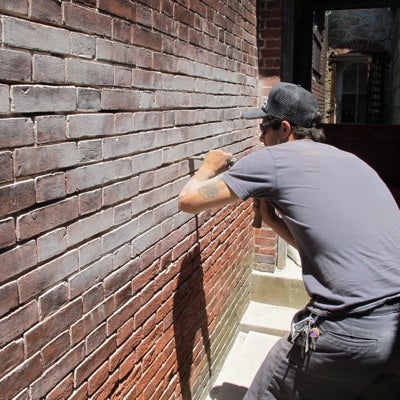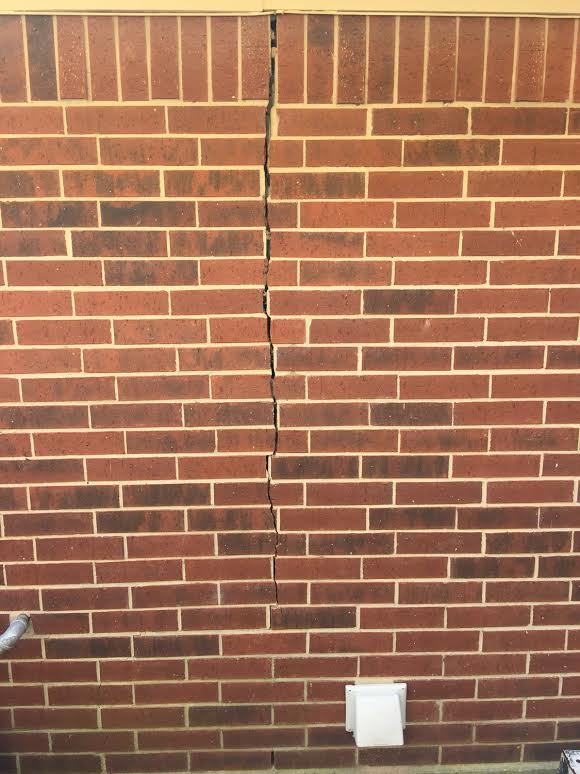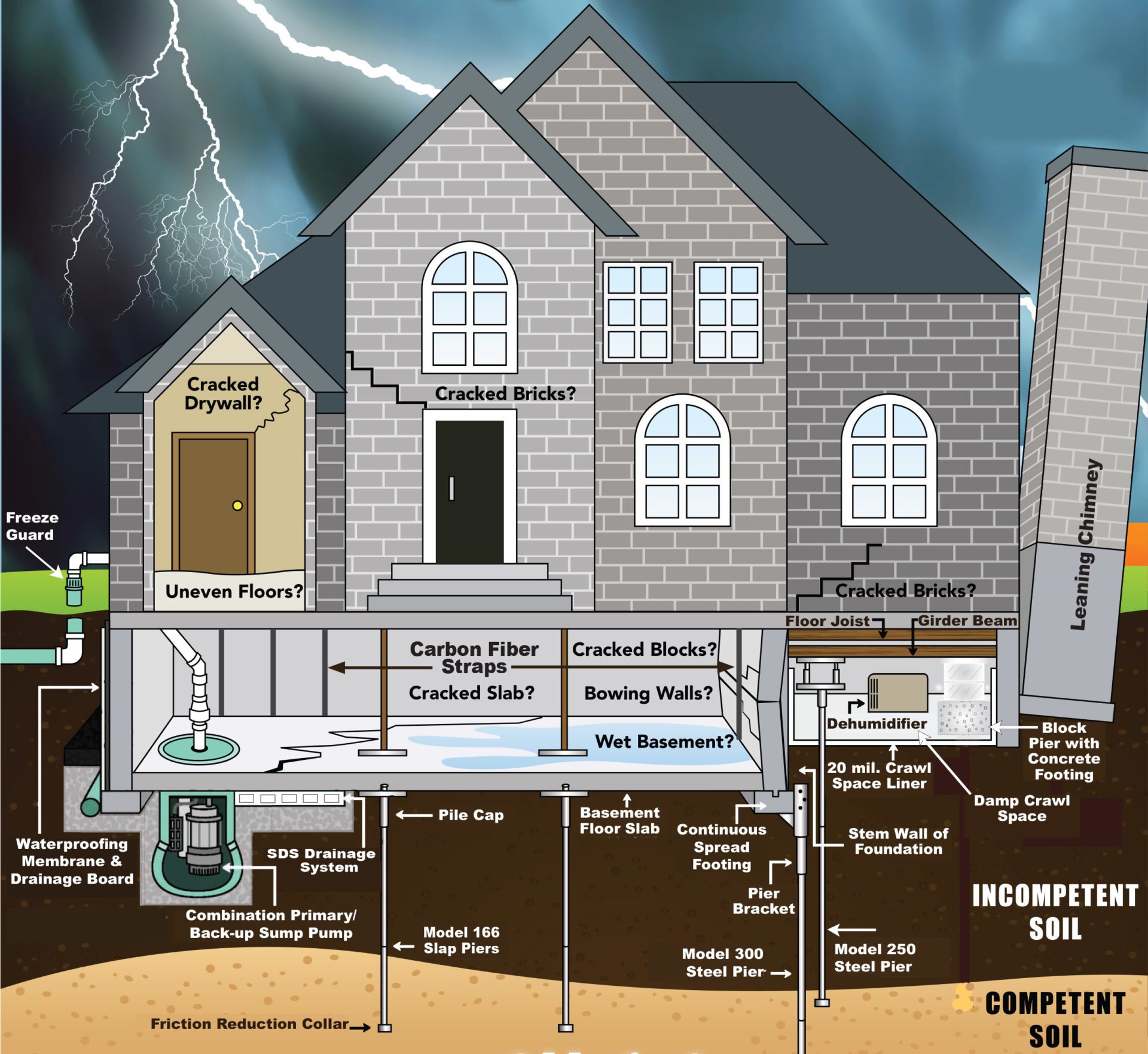
Useful Tips for Repairing Cracked Brick Walls
- Spray the new mortar joints with water at different times of the day for 2-3 days
- After the mortar dries completely, you can use a stiff brush to scrape off excess mortar from brick surfaces
- You can mix mortar coloring when you prepare the mortar to match the color of your wall
- Remove the cracked mortar from the brick wall. Remove the old cracked horizontal mortar from the joints using a raking bar. ...
- Spray the brick wall. After all the mortar is removed, you'll need to spray the wall with water. ...
- Patch the joints with mortar. ...
- Point the brick wall.
Do it yourself repair cracking brick repair?
With the help of a chisel, start off with smoothly chipping off any loose brick pieces. It would be wise to save the chipped off pieces for later use as they would help cover the cracks. Grab a brush (a stiffer brush would be handier) and clean the cracks, removing the brick powder.
How to repair cracks in brick with Sean buino?
How to Repair Cracks in Brick with Sean Buino - YouTub . Cracks often originate in 90-degree corners, so check those places carefully. Stepped cracks along block foundations or brick walls may be caused by upheaval. The best way to stave off major repair work is to monitor the crack width.
How to repair Stamped Concrete cracks at home?
Sullivan suggests repairs in the following circumstances:
- The crack has become a safety hazard.
- The crack compromises the concrete’s performance.
- The appearance of the crack takes away from the look of the concrete.
How to seal cracks in bricks?
How to Mortar Bricks in 6 Steps
- Rake Out the Bed Joints. Scrape out the horizontal joints to a depth of at least ¾ inch. ...
- Clean Out the Head Joints. After removing three or four courses of bed-joint mortar, dig out the vertical joints. ...
- Wash Down the Wall. ...
- Mix the Mortar. ...
- Fill the Joints. ...
- Brush the Wall. ...

Can cracked bricks be repaired?
If the mortar is cracked, it can be repaired with a simple process known as repointing. If bricks are cracked that typically means the damage has extended past the mortar. It is easier to fix cracked or crumbling mortar as opposed to bricks, but if mortar damage goes ignored for too long bricks are bound to damage.
How do you fix a cracked brick house?
0:483:17How to Repair Cracks in Brick with Sean Buino - YouTubeYouTubeStart of suggested clipEnd of suggested clipWe grab a rigid putty knife and get to work. All I'm doing is getting the loose mortar. Out of theMoreWe grab a rigid putty knife and get to work. All I'm doing is getting the loose mortar. Out of the joint. So we can fill it back up the mortar patching product will not adhere.
Do cracks in brick mean foundation problems?
Small brick cracks are common and do not indicate foundation problems. That's because brick is naturally prone to expanding. If only a few bricks are affected by fractures, don't worry about it. Deterioration and structural foundation damage is probably not a concern.
Do cracked bricks need to be replaced?
Repairs may include filling and sealing cracks for minor issues all the way up to the installation of support beams and external piers for serious damage. When the cracks or holes in your bricks or concrete blocks are so severe that the wall can no longer bear its load, the masonry will need replacement.
Why do bricks crack on a house?
Vertical cracking is typically due to brick expansion (remember, bricks are porous and absorb/release moisture like a sponge). Bricks can grow in size as they are exposed to humidity. As bricks grow, they can cause cracking at the seams of walls.
How do you reinforce a cracked brick wall?
How to repair cracked brick walls step-by-stepRemove the cracked mortar from the brick wall. Remove the old cracked horizontal mortar from the joints using a raking bar. ... Spray the brick wall. After all the mortar is removed, you'll need to spray the wall with water. ... Patch the joints with mortar. ... Point the brick wall.
What do cracks in bricks mean?
Bricks are made of compressed baked clay with inflexible properties. As a result, they're more likely to crack when your house settles or due to external factors. Brick walls with small cracks are common and typically harmless. However, large brick cracks in the exterior of your house can indicate a foundation issue.
Do spalled bricks need to be replaced?
We will also define what spalling is, what causes it and give you some tips on how to prevent it. If you notice that any of the bricks on your property are beginning to flake, crumble, or fall apart, you will need to replace them as soon as possible or hire a professional to do it for you.
Can you replace individual bricks?
2:004:27Replacing a single damaged brick in a wall - YouTubeYouTubeStart of suggested clipEnd of suggested clipTry your new brick in for size. And when you're sure it's going to fit. Then start mixing up someMoreTry your new brick in for size. And when you're sure it's going to fit. Then start mixing up some sand cement. The sign of cement milks will very much depend. On the existing sand cement.
What do cracks in bricks mean?
Bricks are made of compressed baked clay with inflexible properties. As a result, they're more likely to crack when your house settles or due to external factors. Brick walls with small cracks are common and typically harmless. However, large brick cracks in the exterior of your house can indicate a foundation issue.
Are step cracks serious?
Stair-step foundation cracks Like diagonal cracks, stair-step cracks occur due to the differential settling of the foundation. If they're only found in the mortar joints between the brick or block, the crack is not serious and can be repaired by simply reapplying the mortar.
Why do bricks crack?
Cracks form in brick walls for many reasons such as earthquakes, moisture, shifting and reactive soil, changing seasons, deteriorating building materials, nearby heavy construction work, large trees in your vicinity. Some types of cracks indicate structural damage. You should talk to a professional when you see them.
What is the most common crack in a brick wall?
Common Cracks in Brick Walls That You Can Repair. The most common cracks in brick walls are in mortar joints. A mortar joint is the mortar that lies between bricks in a wall. Mortar joints are the most elastic and weakest points in a brick wall. The changing seasons and exposure to water throughout the year take a toll on them.
What are horizontal cracks in brick?
You should talk to a professional when you see them. Horizontal and zig-zag cracks in your wall are signs of structural damage. You can fix cosmetic cracks yourself. These are usually vertical cracks that appear in the mortar between bricks or in the brick itself. Smaller cracks in one brick are also something that you can tackle on your own.
How to get rid of mortar dust?
Use a garden hose with high pressure to flush out debris, dust, and small pieces of mortar left behind. Make sure you protect your floors and other walls from the water with plastic sheeting. If it’s not possible to use a hose inside, a shop vac can do an ok job, but it’s not as good as using water.
Can you fix cracks in brick?
However, you can fix them easily with the right tools. Cracks in bricks are more complicated to repair than cracked mortar joints. Cracked bricks require immediate attention because they allow moisture to seep in deeper, which can cause even worse damage if left unchecked.
Why is my brick wall cracking?
The cause—and two possible solutions. Cracking or spalling in bricks may occur when the wrong type of mortar is used. There are no easy solutions; you may need to either replace all the mortar or rebuild the wall.
Can you patch bricks that are breaking apart?
If the bricks in your siding or brick wall are breaking apart, simple patching probably won’t work . Any patch material you apply will just pop out again unless you solve the underlying expansion/contraction problem.
How to prevent cracked bricks?
Preventing cracked bricks starts with the building process. Connectors should be properly selected and applied, as well as installation of thermal expansion joints. The actual foundation should also be properly constructed so that the risk of water damage and uneven settling is reduced.
Why do bricks crack?
Brick cracks are generally caused by internal or external pressure. Cracked bricks are often much more than just an aesthetic problem, but a potential sign of larger structural damage. That’s why it’s just as important to find the underlying issue, as it is to fix the actual crack.
Why is it good to have one brick in a foundation?
This is good because it means you only need to fix the bricks and surrounding mortar as opposed to an issue with your foundation.
Why are bricks cracking in my Toronto home?
In most cases, brick cracks that surface on the front facing exterior wall are fixable. Brick cracks are generally caused by internal or external pressure.
Why do bricks crack when you remove vines?
If you try and remove the vines by pulling on them it will cause the surrounding bricks to crumble and crack. The greenery puts additional moisture into the bricks, which makes them far more sensitive. Foundation issues, if your foundation shifts out of place it can easily cause bricks to crack. Preventing cracked bricks starts with ...
What happens if mortar cracks?
If the mortar is cracked, it can be repaired with a simple process known as repointing. If bricks are cracked that typically means the damage has extended past the mortar. It is easier to fix cracked or crumbling mortar as opposed to bricks, but if mortar damage goes ignored for too long bricks are bound to damage. Thermal expansion.
Why does a wall crack when exposed to the sun?
When the wall is regularly exposed to the hot sun the wall actually expands. Over time, this expansion causes cracks to form. Freeze and thaw cycles. When the wall is placed under pressure due to temperature fluctuations between hot and cold, it is at risk for cracking.
Can concrete mix cause cracking?
Repairing the damage with a cement or concrete mix not only looks unsightly but can cause future and potentially more severe damage in the future due to cracking caused by the repair material being harder than the original.
Can broken bricks be damaged?
Whether damaged by impact, the elements, the removal of render or by the use of the wrong type of mortar in the bed joint, broken bricks can be unsightly and can cause further damage to the building or structure through water ingress.
How to make a brick mortar?
Mix the Mortar. Mist the brick again. Then, following the directions on the bag, stir water into the dry mix until it reaches the consistency of peanut butter and clings to an upended trowel. Wait until a film of water forms on the mix, about 15 minutes. Stir the water back in.
How to keep mortar from drying out?
When the mortar is firm to the touch, brush diagonally across it to remove any dry mortar crumbs. (Brushing in line with the joints can pull out the fresh mortar.) Then carefully sponge mortar residue off the brick faces. For the next three days, use a tarp to protect the soft joints from the sun, wind, or hard rain, and give the wall a daily misting to keep the brick and mortar moist.
Who wrote the poem "Brickwork is just so much rubble without a bed of mortar to seal and hold
By Danny Palousek. Even the most beautiful brickwork is just so much rubble without a bed of mortar to seal and hold it together.
What is hydraulic lime?
You can choose between hydraulic lime, which comes in bags and hardens when it reacts with water, much like portland cement, and lime putty mortar, which comes in buckets and slowly hardens by reacting with carbon dioxide in the air.
Why does my brick house crack?
As the house’s continued weight causes the soil underneath to become more compact, this will usually cause at least a little bit of cracking. Unless your house is settling very unevenly, this may not be a foundational issue at all. If settling is not the brick cracks cause, then water retention might be. Bricks are naturally porous, so ...
How to tell if brick is cracked?
While some cracks are annoying or unsightly, others are indicators of a more serious problem. It’s hard to tell for sure whether the cracking is a sign of a serious problem or not without the help of a professional brick mason. However, the following warning signs should help you determine when the cracks in your home’s bricks need immediate attention or could be signaling a foundation issue: 1 windows or doors sticking or not functioning because of changes in brick wall structure 2 dramatic changes in shape, length, or direction of a crack. 3 cracking near the roof or foundation of your home. 4 leaning brick chimney.
Why do bricks retain water?
If settling is not the brick cracks cause, then water retention might be. Bricks are naturally porous, so when they’re exposed to rain or sprinkler water, they tend to absorb it. Usually, when the sun comes out, it will help evaporate the water and your bricks will be none the worse for wear.
